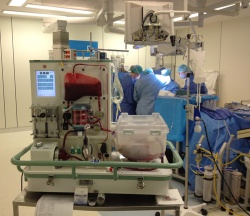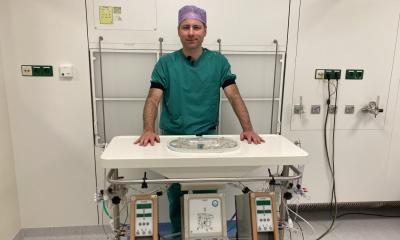Organ Transplantation
Innovative technique for liver transplants
Surgeons at the University Hospitals Leuven have used a new technique for two recent liver transplants: in both cases the organ was preserved prior transplantation in a device that mimics the environment of that in the human body, making sure the liver stays ‘healthier’. The device can even assess and improve the quality of the liver.

So far, this innovative technique had not yet been performed outside the UK. The first transplantation was performed early December 2014, followed by a second one a couple of weeks later. In the meantime both transplanted patients have left the hospital and are recovering well.
Damage to the donor organ
It is standard practice to cool down a donated liver to a temperature of 4 to 6 degrees and to store it on ice. The cold slows down the metabolism and ensures that the organ, which is left with no oxygen supply, remains ‘healthy’ for a longer time. Professor Jacques Pirenne, one of the physicians of the transplant team, explains: “The classic preservation method usually causes damage to the organ. When this damage is too extensive, it renders the liver unsuitable for transplantation. Another disadvantage is the limited preservation time, turning every transplantation into a race against the clock.”
Perfusion with oxygenated blood
The University of Oxford has developed OrganOx Metra, a device intended to preserve and maintain a liver in an environment that mimics that of the body: the organ is perfused with oxygenated blood at normal body temperature. Research in pigs has already shown that this preservation method offers many advantages over cold storage technologies.
Professor Jacques Pirenne: “In the UK, already more than fifty liver transplants have been performed using the OrganOx Metra. And now the University Hospitals Leuven team follows suit by participating in an international trial. This trial enables us to test the technique on a larger scale while at the same time checking whether the technique can live up to its expectations.” The trial is part of the European Consortium on Organ Preservation in Europe (COPE), a project financed by the European Commission which aims to optimise organ preservation.
Important advance
Professor Pirenne: “Over the last decades, there has been little progress as far as preserving livers for transplantation is concerned. This new technique changes all that. Now that a liver can be kept ‘alive’ outside the body, the quality of the organ improves, leading to better outcome for transplant patients. We expect that, because of the improved quality as well as the fact that the device can assess liver function, more organs will become viable for transplantation. This is important: today there are still patients dying because of a lack of suitable organs.”
Source: University Hospitals Leuven
25.03.2015





